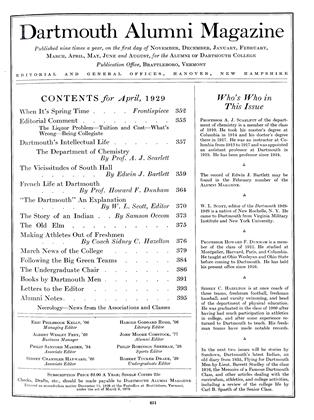Wishing to recommend to the reader of this corner a book of popular science,
I knew that Prof. A. S. Eddington's The Nature of thePhysical TVorld was the indicated choice, since it is probably the most important scientific book for the layman that has appeared recently. But though Prof. Eddington writes with ease and humor, and though he unquestionably tries to make the recent advances of physics comprehensible by any attentive person, what he reveals is so new to me, and its implications so far-reaching, that I cannot comment upon his book. I should have to be either philosopher or scientist, and I am neither. But the concepts of nature he treats of, and the present position of his science he shows, no really educated person can afford not to know.
I can, however, write more freely of another scientific book, George Jennison's Noah's Cargo. It concerns the creatures who inhabit our zoos, the odd conceptions of them men have held, their strange appearances and ways. The book is written for the easily curious, for the person who is amused at the contrast between his idea of nature and the truth. Perhaps you too have always associated flamingoes with croquet balls, remembering Alice at the garden party. But Mr. Jennison says that flamingoes at the slightest careless handling will die! Perhaps you can't imagine a tailless monkey, but there are some. And in South Africa horses have had to be painted khaki, to keep them from being killed by a rhinoceros!
Mr. Jennison gives a footnote to the French Revolution, telling how the Jacobins of Versailles marched to the menagerie and demanded Liberty for the oppressed wild animals, a demand the curator gracefully agreed to with the remark, however, that the animals were impervious to any sentiment of gratitude, The Jacobins thereupon marched back, leaving the animals still oppressed.
We know how wonderful a work is man, but we forget that man in the past found animals even more wonderful. Man has deified, and here and there still deifies, cows, lions, tigers, elephants, rhinoceroses, bears, otters, snakes, and even the ichneumon—better known, perhaps, as Ricky-Ticky-Tavy. The Kings of Siam used to send God in the person of a white elephant to live with objectionable subjects—a ruinous burden, whence our proverb.
That false teeth were made from hippopotamus teeth, that the explosive force of steam was used to keep off tigers in China during the thirteenth century, that Cato publicly denounced parrots as a danger to the state, that a rhinoceros put a battery of artillery out of business, that monkeys have been trained to act like soldiers in battle, that there really are unicorns, but no panthers, that Arab horses are probably faded zebras, these, and more things just as odd, you may learn from Noah'sCargo.
 View Full Issue
View Full Issue
More From This Issue
-
 Class Notes
Class NotesCLASS OF 1923
April 1929 By Truman T. Metzel, "Charlie Chadbourne" -
 Article
ArticleThe Vicissitudes of South Hall
April 1929 By Edwin J. Bartlett -
 Lettter from the Editor
Lettter from the EditorEditorial Comment
April 1929 -
 Article
ArticleFrench Life at Dartmouth
April 1929 By Howard F. Dunham -
 Class Notes
Class NotesCLASS OF 1899
April 1929 By Louis P. Benezet -
 Article
Article"The Dartmouth," An Explanation
April 1929 By W. L. Scott, Editor
W. B. P.
Books
-
 Books
BooksALUMNI PUBLICATIONS
June, 1922 -
 Books
BooksAlumni Notes
October 1948 -
 Books
BooksAlumni Articles
MAY 1970 -
 Books
BooksHIS MAJESTY'S PYJAMAS
January 1935 By George L. Frost '21 -
 Books
BooksCONTEMPORARY UNIONISM IN THE UNITED STATES
January 1949 By Ross Stagner -
 Books
BooksAMERICAN LIFE AND THE SCHOOL CURRICULUM
January 1937 By William F. Geiger '92






